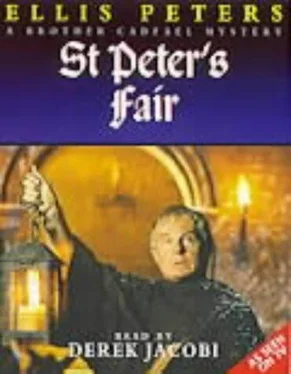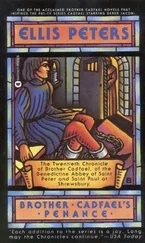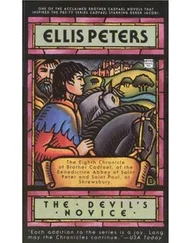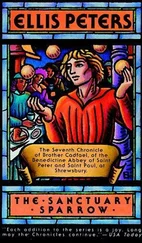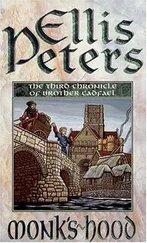Ellis Peters - St Peter's Fair
Здесь есть возможность читать онлайн «Ellis Peters - St Peter's Fair» весь текст электронной книги совершенно бесплатно (целиком полную версию без сокращений). В некоторых случаях можно слушать аудио, скачать через торрент в формате fb2 и присутствует краткое содержание. Жанр: Исторический детектив, на английском языке. Описание произведения, (предисловие) а так же отзывы посетителей доступны на портале библиотеки ЛибКат.
- Название:St Peter's Fair
- Автор:
- Жанр:
- Год:неизвестен
- ISBN:нет данных
- Рейтинг книги:4 / 5. Голосов: 1
-
Избранное:Добавить в избранное
- Отзывы:
-
Ваша оценка:
- 80
- 1
- 2
- 3
- 4
- 5
St Peter's Fair: краткое содержание, описание и аннотация
Предлагаем к чтению аннотацию, описание, краткое содержание или предисловие (зависит от того, что написал сам автор книги «St Peter's Fair»). Если вы не нашли необходимую информацию о книге — напишите в комментариях, мы постараемся отыскать её.
St Peter's Fair — читать онлайн бесплатно полную книгу (весь текст) целиком
Ниже представлен текст книги, разбитый по страницам. Система сохранения места последней прочитанной страницы, позволяет с удобством читать онлайн бесплатно книгу «St Peter's Fair», без необходимости каждый раз заново искать на чём Вы остановились. Поставьте закладку, и сможете в любой момент перейти на страницу, на которой закончили чтение.
Интервал:
Закладка:
Corbière took one close look at him, and let out a gasp and an oath. “Fowler!
Devil take the sot! Is this how he obeys me? By God, I’ll make him sweat for it!” And he filled a fist with the thick brown hair and shook the fellow furiously, but got no more out of him than a louder snort, the partial opening of one glazed eye, and a wordless mumble that subsided again as soon as he was dropped, disgustedly and ungently, back into the turf.
“This drunken rogue is mine … my falconer and archer, Turstan Fowler,” said Ivo bitterly, and kicked the sleeper in the ribs but not savagely. What was the use? The man would not be conscious for hours yet, and what he suffered afterwards would pay him all his dues. “I’ve a mind to put him to cool in the river! I never gave him leave to quit the abbey precinct, and by the look of him he’s been out and drinking - Good God, the reek of it, what raw spirit can it be? - since ever I turned my back.”
“One thing’s certain,” said Hugh, amused, “he’s in no case to walk back to his bed. Since he’s yours, what will you have done with him? I would not advise leaving him here. If he has anything of value on him, even his hose, he might be without it by morning. There’ll be scavengers abroad in the dark hours - no fair escapes them.”
Ivo stood back and stared down disgustedly at the oblivious culprit. “If you’ll lend me two of your men, and let us borrow a board here, we’ll haul him back and toss him into one of the abbey’s punishment cells, to sleep off his swinishness on the stones, and serve him right. If we leave him there unfed all the morrow, it may frighten him into better sense. Next time, I’ll have his hide!”
They hoisted the sleeper on to a board, where he sprawled aggravatingly into ease again, and snored his way along the Foregate so blissfully that his bearers were tempted to tip him off at intervals, by way of recompensing themselves for their own labour. Cadfael, Beringar and the remainder of the party were left looking after them somewhat ruefully, their own errand still unfulfilled.
“Well, well!” said Rhodri ap Huw softly into Cadfael’s ear, “Euan of Shotwick is taking a modest interest in the evening’s happenings, after all!”
Cadfael turned to look, and in the shuttered booth tucked under the wall a hatch had certainly opened, and against the pale light of a candle a head leaned out in sharp outline, staring towards where they stood. He recognised the high-bridged, haughty nose, the deceptively meagre slant of the lean shoulders, before the hatch was drawn silently to again, and the glover vanished.
They worked their way doggedly, yard by yard, all the way back to the riverside, where Roger Dod was waiting in a fume of anxiety, but they found no trace of Thomas of Bristol.
A late boat coming up the Severn from Buildwas next day, and tying up at the bridge about nine in the morning, delayed its unloading of a cargo of pottery to ask first that a message be sent to the sheriff, for they had other cargo aboard, taken up out of a cove near Atcham, which would be very much the sheriff’s business. Gilbert Prestcote, busy with other matters, sent from the castle his own sergeant, with orders to report first to Hugh Beringar at the abbey.
The particular cargo the potter had to deliver lay rolled in a length of coarse sail-cloth in the bottom of the boat, and oozed water in a dark stain over the boards. The boatman unfolded the covering, and displayed to Beringar’s view the body of a heavily-built man of some fifty to fifty-five years, fleshy, with thinning, grizzled hair and bristly, bluish jowls, his pouchy features sagging doughily in death. Master Thomas of Bristol, stripped of his elaborate capuchon, his handsome gown, his rings and his dignity, as naked as the day he was born.
“We saw his whiteness bobbing under the bank,” said the potter, looking down upon his salvaged man, “and poled in to pick him up, the poor soul. I can show you the place, this side of the shallows and the island at Atcham. We thought best to bring him here, as we would a drowned man. But this one,” he said very soberly, “did not drown.”
No, Thomas of Bristol had not drowned. That was already evident from the very fact that he had been stripped of everything he had on, and hardly by his own hands or will. But also, even more certainly, from the incredibly narrow wound under his left shoulder-blade, washed white and closed by the river, where a very fine, slender dagger had transfixed him and penetrated to his heart.
The First Day of the Fair
CHAPTER 1
The first day of Saint Peter’s Fair was in full swing, and the merry, purposeful hum of voices bargaining, gossiping and crying wares came over the wall into the great court, and in at the gatehouse, like the summer music of a huge hive of bees on a sunny day. The sound pursued Hugh Beringar back to the apartment in the guest-hall, where his wife and Emma Vernold were very pleasurably comparing the virtues of various wools, and the maid Constance, who was an expert spinstress, was fingering the samples critically and giving her advice.
On this domestic scene, which had brought back the fresh colour to Emma’s cheeks and the animation to her voice, Hugh’s sombre face cast an instant cloud. There was no time for breaking news circuitously, nor did he think that this girl would thank him for going roundabout.
“Mistress Vernold, my news is ill, and I grieve for it. God knows I had not expected this. Your uncle is found. A boat coming up early this morning from Buildwas picked up his body from the river.”
The colour ebbed from her face. She stood with frightened, helpless eyes gazing blindly before her. The prop of her life had suddenly been plucked away, and for a moment it seemed that all balance was lost to her, and she might indeed fall for want of him. But by the time she had drawn breath deep, and shaped soundlessly: “Dead!” it was clear that she was firm on her own feet again, and in no danger of falling. Her eyes, once the momentary panic and dizziness passed, looked straight at Hugh and made no appeal.
“Drowned?” she said. “But he swam well, he was raised by the river. And if he drank at all, it was sparingly. I do not believe he could fall into Severn and drown. Not of himself!” she said, and her large eyes dilated.
“Sit down,” said Hugh gently, “for we must talk a little, and then I shall leave you with Aline, for of course you must remain here in our care for this while.
No, he did not drown. Nor did he come by his death of himself. Master Thomas was stabbed from behind, stripped, and put into the river after death.”
“You mean,” she said, in a voice low and laboured, but quite steady, “he was waylaid and killed by mere sneak-thieves, for what he had on him? For his rings and his gown and his shoes?”
“It is what leaps to the mind. There are no roads in England now that can be called safe, and no great fair that has not its probable underworld of hangers-on, who will kill for a few pence.”
“My uncle was not a timid man. He has fought off more than one attack in his time, and he never avoided a journey for fear in his life. After all these years,” she said, her voice aching with protest, “why should he fall victim now to such scum? And yet what else can it be?”
“There are some people recalling,” said Hugh, “that there was an ugly incident on the jetty last evening, and violence was done to a number of the merchants who were unloading goods and setting up stalls for the fair. It’s common knowledge there was bad blood between town and traders, of whom Master Thomas was perhaps the most influential. He was involved bitterly with the young man who led the raid. An attack made in revenge, by night, perhaps in a drunken rage, might end mortally, whether it was meant or no.”
Читать дальшеИнтервал:
Закладка:
Похожие книги на «St Peter's Fair»
Представляем Вашему вниманию похожие книги на «St Peter's Fair» списком для выбора. Мы отобрали схожую по названию и смыслу литературу в надежде предоставить читателям больше вариантов отыскать новые, интересные, ещё непрочитанные произведения.
Обсуждение, отзывы о книге «St Peter's Fair» и просто собственные мнения читателей. Оставьте ваши комментарии, напишите, что Вы думаете о произведении, его смысле или главных героях. Укажите что конкретно понравилось, а что нет, и почему Вы так считаете.
